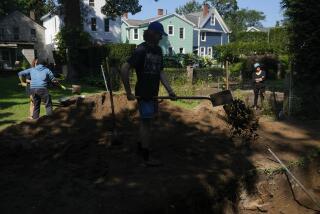African Festival Stirs Ancestral Passions
- Share via
At the “Door of No Return” she could feel the presence of the ancestors, Africans sold into lives of slavery, then shipped like cargo across the seas.
There, in a slave castle off the coast of Ghana, Linda Timmons-Iverson experienced grief, agony, anger and finally a calm resolve.
“The ancestors were reaching out to me, trying to make me understand what they felt,” said Timmons-Iverson, development services coordinator for the city of Compton. “I recognized that we . . . all have a part to play. My part is to help take as many people to Africa so we can understand our culture, our ancestors and go on from there.”
Timmons-Iverson’s passion symbolizes the spirit behind a series of Pan-Africanist celebrations being held locally and internationally. On Saturday, Compton held its first World African Unity Festival, a celebration that included presentations by dignitaries from African nations, dance and music, all encouraging the building of bridges between Africans and African Americans.
Along with a contingent headed by Compton Mayor Omar Bradley and other city officials, Timmons-Iverson will return to Ghana next week to take part in that nation’s first Emancipation Day celebrations and to establish a sister-city relationship.
Ghana was the first African nation to win its freedom from colonial powers.
Emancipation Day was created to “mark the emancipation of our brothers and sisters and ourselves from slavery and other forms of oppression,” said Kingsley Karimu, head of chancery in the Ghanaian Embassy in Washington. “It’s a day that is set aside to look back on our past.”
The event is expected to attract people of African descent from across the globe who see reaching back as a way to move forward.
“I heard the call and could not wait to respond,” said actor Glynn Turman, who will make the trip with his wife and two children and will narrate a video being made about the event.
“I have many different emotions when I think about going to Africa. They’re the kind we all have,” he said. “You look forward to going to a place that your ancestors are from. You look forward to being received, hopefully, as part of a lost family. You want to see a place where your own people are in control and respected without the pressures of trying to fit in.”
And the highlight of the gathering will be the reinterment of the bones of runaway slaves discovered in Jamaica and in an unearthed burial ground in lower Manhattan in 1991, said Louise Ama Foster of Isis Marketing Concepts, a local organizer of the event. The bones will be returned through the “Door of No Return,” in what is expected to be a moving ceremony. “It’s something I never thought I’d have a chance to witness or feel,” Foster said. “The main goal is to pay homage to people who lost their lives during the middle passage and also to bring back together people of the diaspora.”
The idea of coming together was echoed again and again at the festival held Saturday at the Compton Auto Plaza.
Representatives and ambassadors of several African nations--including Nigeria, Swaziland and the Sudan--welcomed African Americans to return and build economic and social relationships with those in Africa.
“It will reunite the family,” said Mahdi Ibrahim Mohamed, ambassador of the Sudan. “It will build bonds of brotherhood. Many Europeans go to Africa for business, still some of them go with the idea of exploiting. This is why we need African Americans to go with the idea of building brotherhood and sisterhood, a win-win situation rather than a win-exploit or win-destroy relationship that characterized colonialism.”
African Americans possess the technological skills and education that will benefit the nation, Mohamed said. In return, the Sudan and other nations offer untapped potential, land and minerals.
Sponsored by the city of Compton, the celebration, which continues today, is the first in a series of events highlighting the African, Latin and Asian heritage of Compton residents, Bradley said.
“We believe if people have pride in themselves they won’t do some of the destructive things they’re involved in,” he said.
For dancers Nikkanni Edmondson and Maanami Camara, performers with the African dance ensemble Le Ballet de Kouman Kele, African culture is more than music and dance. It is understanding and practicing the best of the values and morals traditional African society has to offer.
“We can’t wait for somebody to tell us who we are,” Edmondson said. “We need to go find out for ourselves.”
“We are African,” Camara said. “It needs to be taught to the kids everyday. More people need to recognize, you don’t need to wait until the African marketplace to wear something African.”
Geronimo Pratt, Saturday’s keynote speaker, was given a key to the city and several standing ovations. The former Black Panther Party leader was released from prison in 1997 after 27 years, when his 1972 murder conviction was overturned.
“The bottom line is we are African,” Pratt told the audience. “And African unity is the key to bringing all our solutions into fruition. . . . We need to meditate on the messages the ancestors are telling us.”
More to Read
Sign up for The Wild
We’ll help you find the best places to hike, bike and run, as well as the perfect silent spots for meditation and yoga.
You may occasionally receive promotional content from the Los Angeles Times.






